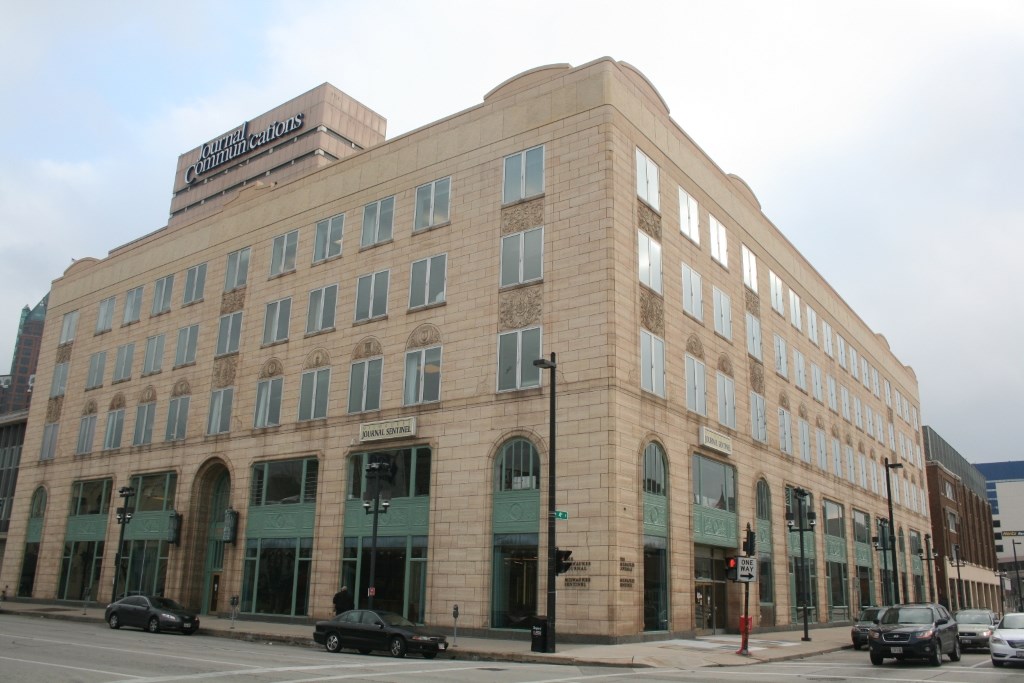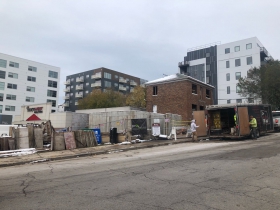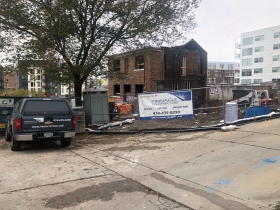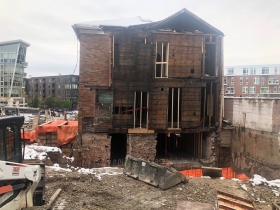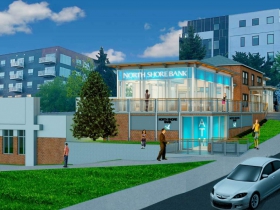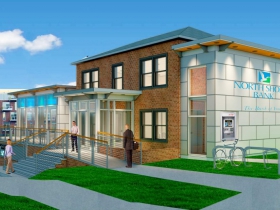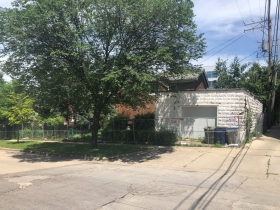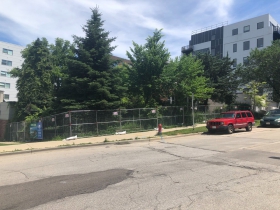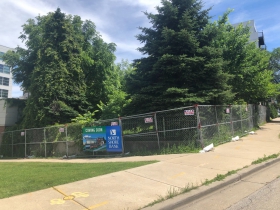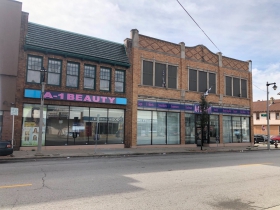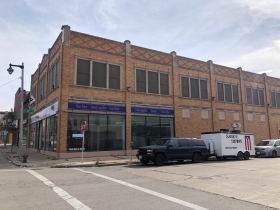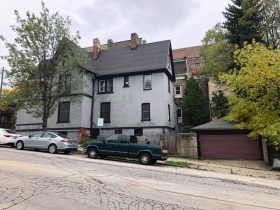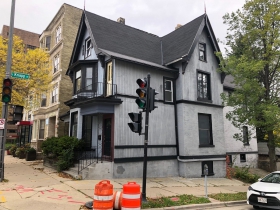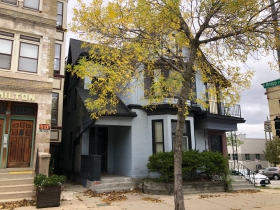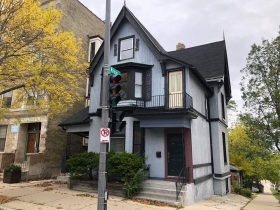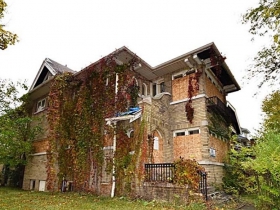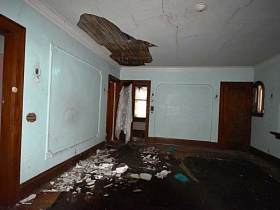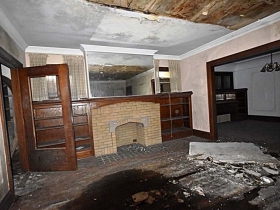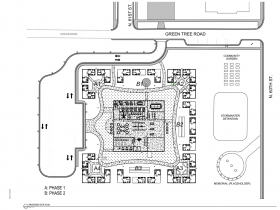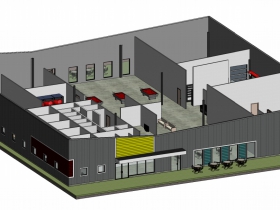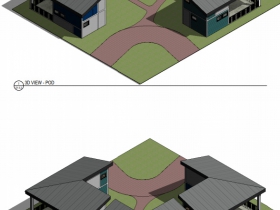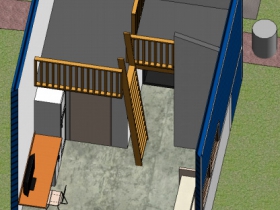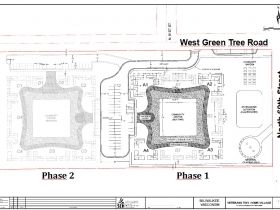Journal Sentinel Complex Sold
Plus: Badger Mutual moving downtown, Northridge security deal, Lion House has a buyer and much more.
The redevelopment of the Milwaukee Journal Sentinel complex took a major step forward this week when developer Joshua Jeffers announced he’s moving forward with purchasing the full-block property at 333 W. State St.
“Our company’s core competency is in complex historic rehabilitation, but Journal Square is an especially challenging undertaking. There certainly are reasons why these properties have been for sale for so long, and why other prospective purchasers decided not to buy them. We like these challenges, however,” said Jeffers in a press release. “We go into projects like this with a wide array of tools and resources to make the impossible possible.”
J. Jeffers & Co. has not released plans on what uses it intends to incorporate into the redeveloped complex, but it has time to figure that out. The newspaper has a lease on the space through late 2020. Gannett announced earlier this year that it will relocate the paper and its 260 employee to the 333 Kilbourn office complex in East Town.
Much of the complex is vacant today, with the newspaper reporting it only uses 25 percent of the space.
The city designated the property as historic in March, granting city oversight for any exterior modifications. Jeffers indicated in his press release that he intends to use federal historic preservation tax credits to finance the redevelop. The National Park Service provides the credits for historically-sensitive redevelopments of federally-designated historic properties.
The developer will need to contend with 56,000-square-foot floor plates in the main building that could pose a challenge for a conversion to housing. The substantial size of the floor plates places much of the space far from a window, something the paper’s reporters are all too aware of.
Jeffers was originally expected to purchase the building with Tony Janowiec, but the latter is no longer part of the deal. The two are still partnering on the redevelopment of the Milwaukee Athletic Club. Jeffers is also developing the Huron Building and has redeveloped a number of historic buildings. Janowiec is leading the redevelopment of the Shops of Grand Avenue mall.
Terms of the acquisition were not disclosed.
Badger Mutual Moving to The Brewery
Badger Mutual Insurance Company is relocating from 1635 W. National Ave. to The 42 development at The Brewery.
“The 42 is a perfect fit for us in terms of size, location, accessibility, and design — cultivating innovative, inspiring energy I am excited to bring to the Badger Mutual team as a new president,” said Badger Mutual’s leader Dan Nigro in a press release.
The company will move approximately 90 employees to a 20,000-square-foot space.
The building, redeveloped by Scott Lurie‘s F Street Group, was formerly a warehouse used by Pabst Brewery. It’s now home to Milwaukee Brewing Co., Glass + Griddle and a number of other office tenants. The property is now fully leased.
City, Northridge Mall Owners Reach Security Agreement
While the future of Northridge Mall is now subject to a court case, the city and property owner U.S. Black Spruce Enterprise Group have an agreement to ramp up prosecution of trespassers.
“We are going to be asking the city to aggressively prosecute anyone who is found on the property without authorization and it is our intention to identify the individuals who have been posting YouTubes after breaching the property for whatever civil remedies and punitive damages are available,” Black Spruce attorney Mark Foley told Sean Ryan this week. Black Spruce will hire a security firm to monitor the property 24 hours a day. A maintenance worker died this summer after touching an electrical box that had been vandalized.
The mall opened in 1972 and closed its doors in 2003. After years of inaction by Black Spruce and a deteriorating building needing an estimated $6 million in repairs, Mayor Tom Barrett and Alderwoman Chantia Lewis announced a plan to demolish the building and seize the property through a condemnation case in April. Black Spruce is opposing that decision in Milwaukee County Circuit Court.
The next hearing regarding the city’s push to demolish the property is scheduled for January 14th.
Lion House Has a Buyer
The Bradley Foundation has found a buyer for the historic homes on N. Franklin Pl. it has long called home.
The Lion House, Bloodgood House and Hawley House will be acquired by Wisconsin Securities Partners.
“Wisconsin Securities Partners is the family office of the Chester and Read families, and formerly was the holding company of Wisconsin Gas and Wisconsin Electric before they became public utilities. Those families over the centuries have history with the law firm that eventually became Foley & Lardner LLP, the Chapman department store and railroad-related businesses,” reported Sean Ryan for the Business Journal.
“Our ideal tenant is someone who has a respect for the past and shares that vision with us,” manager Ross Read told Ryan.
The investment group owns an adjacent property at 1060 E. Juneau Ave.
For a detailed look at the homes and their history, see Michael Horne‘s May 22nd “What’s It Worth” column.
The foundation is relocating to the Hammes Building.
Avenir Deal Advancing
Last week’s feature item for this column, the development of the second and third phases of the Avenir apartment complex, advanced this week.
Members of the Milwaukee County Board’s Economic and Community Development Committee gave informal approval to a revised development agreement with the property’s new owner, Weidner Investment Services, last week.
The Kirkland, WA-based firm would develop two buildings on the sloped block, the first starting in April, with 146 total apartments. The two buildings are scheduled to be completed in November 2022.
The site, formerly at the eastern end of the now-demolished Park East Freeway spur, is now privately owned but governed by a 2012 development agreement with Milwaukee County. That agreement would be replaced by a new deal pending before the county. Weidner would be required to post a $250,000 letter of credit to guarantee the new agreement’s completion. The county would also maintain a purchase option to repurchase the land at a declining cost.
As part of the revised deal, the original development team will pay Milwaukee County $100,000 in compensation for lost property tax revenue and expenses related to a failure to move forward with the second phase.
Tom Daykin reported on the meeting for the Milwaukee Journal Sentinel.
Haymarket Building Sold to Fitness Center Owner
A two-story, Cream-City-brick building at 440 W. Vliet St. has been sold to Anthony Langtimm. According to a Facebook post, Langtimm, operator of Summit Wellness and Ascent Gym, will convert the building to a wellness center.
The building, previously home to Cream City Ribbon, has approximately 32,400 square feet of space. The property was sold to Langtimm for $1.5 million by Mix Properties. The building was built in 1895 according to city records.
Daykin was the first to report the news.
North Shore Plans Unique Downtown Bank
North Shore Bank is transforming an 89-year-old house into a modern bank branch on the north end of downtown Milwaukee.
The bank will open a 1,800-square-foot branch at 510 E. Pleasant St., just east of N. Water St. The new branch will mix a modern office building with a historic home currently on the site.
The house, which was constructed in 1930 according to the Wisconsin Historical Society, would be used as the bank’s front door, while a glassy addition will be built to its west overlooking N. Water St.
Plunkett Raysich Architects is designing the new branch. Pierce Engineering is providing engineering service. Pinnacle Construction is leading the general contracting.
See the photos and renderings.
Photos
Renderings
Pre-Construction
Voces Buying Mitchell Street Building
The non-profit immigrant rights organization Voces de la Frontera has found a new home.
The organization will purchase the two-story building at 733-737 W. Historic Mitchell St. from developer Ryan Pattee for $400,000 and hopes to relocate in early 2020.
“We have been looking for the past six years,” said Executive Director Christine Neumann-Ortiz in an interview. The organization has long outgrown its home at 1027 S. 5th St. and is looking to expand its programming as part of the move.
Neumann-Ortiz said in addition to growing capacity within the membership-based organization, it hopes to be able to lease space within the building to individuals and organizations with similar missions.
She said the new building is a good fit not only because of its size, but its central location within Milwaukee’s Latinx community. Read on.
Bucks Player’s Development Faces Delay
Milwaukee Bucks guard Pat Connaughton‘s plan to develop a high-end apartment building at 1245-1247 N. Milwaukee St. has hit a snag. Preservation advocate Dawn McCarthy has applied for local historic designation for the Victorian Gothic house that currently occupies the site.
Connaughton, through his development firm Beach House, plans to demolish the duplex and construct a three-story, three-unit apartment building on the site.
City assessment records indicate the house was built in 1899, but McCarthy’s application states the building dates back to 1865. It was converted to a duplex in 1918.
Her research, compiled into a report that has been submitted to the Historic Preservation Commission, notes that an architect for the property is unknown as is the exact year it was built. But records indicate people were living in the building since 1865. Learn about what comes next.
Proposal Would Fund Emergency Housing
A budget amendment introduced by Alderwoman Chantia Lewis would have the city redevelop 10 units from the hundreds of properties it has acquired through property-tax foreclosure as temporary housing for city residents.
Lewis told the Finance & Personnel Committee she was drawn to the issue after learning of families who were displaced after members tested high for blood-lead levels, requiring in-home abatement work.
“It got me thinking, we have a housing stock, why not produce an emergency place for these people to go?” said Lewis. She said the targeted properties would be multi-family buildings.
The $300,000 program would be funded by reducing the corresponding amount of borrowing planned to be used to purchase new squad cars for the Milwaukee Police Department. Learn more.
What’s This Sherman Park Home Worth?
The city acquired a severely-damaged home through property tax foreclosure that it wants to sell, a buyer has emerged that wants to improve and live in the property and the local alderman loves the deal. Should be easy to sell the property, right?
If that was the case, Stephanie Holt would already be on the way to renovating her future home at 2903-2805 N. 48th St. She submitted an offer to buy the duplex in April for $80,250, noting she would live in one unit and rent out the other.
But instead of closing the sale, Holt and the Department of City Development (DCD) spent months reevaluating the sale price based upon its estimated market value and multiple bids to repair the inhabitable house.
The debate entered the public sphere in September when Holt appeared at the Joint Committee on the Redevelopment of Abandoned and Foreclosed Homes. She said DCD, which had originally listed the house for $107,000, was wrong from the beginning. Holt, a commercial and industrial property assessor for the Wisconsin Department of Revenue, accused the department of being difficult to work with. Read on.
Controversy Over Historic Building’s Mural
The city’s Historic Preservation Commission finds itself grappling with what to do with a growing issue – the proliferation of murals.
A new mural by artist Mauricio Ramirez on the S. 12th St. facade of a two-story, historically-designated building at 1202 W. Historic Mitchell St. has forced the issue. Entitled “Growth,” the mural was completed in late July.
Commission staffers Carlen Hatala and Tim Askin recommend that masonry never be directly painted. “Paint has the significant potential to do damage to the structure,” said Hatala. “It perpetuates a repainting cycle and a cost. It was never meant to be painted.”
Hatala and Askin said future guidelines should promote demountable murals, that is murals that are painted on a removable paneling.
At the commission’s October meeting, Hatala recommended denying retroactive approval for Ramirez’s mural. A key issue before the commission is whether the building’s 12th Street facade was painted before the Historic Mitchell Street district was created in 1986 or painted later without commission approval.
Given that the wall had been painted before the recent mural was created, Commissioner and Alderman Robert Bauman said requiring the mural’s removal was akin to requiring the property owner to simply let the paint flake off or pay to remove it, even if they acquired the property after it was painted.
“That’s an absurd position. You understand that?” asked Bauman rhetorically. Read on.
Tiny Homes Village Design Approved
Veterans Outreach of Wisconsin‘s proposed tiny home village for homeless veterans received design approval Tuesday morning, the last major step before construction would begin next spring.
The $2 million development, which is based on another facility VoW operates in Racine, would provide support services in a sober-living environment for military veterans that are homeless or facing homelessness. A total of 48 homes, ranging from 172 square feet to 232 square feet in size would be built on a city-owned lot at 6767 N. 60th St.
“They’re small, they’re great, but they’re not big enough for them to want to stay forever,” said VoW executive director Jeff Gustin in September when the citizen-led City Plan Commission reviewed the design.
A zoning change for the project was before the Common Council’s Zoning, Neighborhoods & Development Committee Tuesday. The Common Council approved selling the land for the project for $35,000 in September.
“I’m proud to announce the last time I spoke before you we had eight graduates, now we have nine graduates,” said Gustin of the Racine project. Veterans live in the homes while learning job skills and receiving other supportive services.
Renderings and Architectural Layout
Site Plans
Douglas Dynamics’ Expansion Advances
Douglas Dynamics, a manufacturer of work truck equipment, is planning to expand its Milwaukee manufacturing facility and headquarters. It has acquired a car dealership bordering its N. 73rd St. campus and is planning to redevelop the site as an expanded manufacturing plant with space for up to 50 more employees.
The publicly-traded company is the leading manufacturer of snowplows and ice removal equipment. It traces its history back to the formation of Western Welding and Manufacturing in 1950 and Fisher Engineering in 1948.
“I’m probably the only person in the room that was glad it snowed last night,” said company engineering manager Jim Smith on Tuesday morning at a meeting of the Zoning, Neighborhoods & Development Committee. The company is pursuing a zoning change to accommodate the expansion.
Douglas Dynamics paid $2.2 million in April for the 8.9-acre property at 7676 N. 76th St. that was most recently occupied by a Russ Darrow Chrysler Dodge Jeep Ram car dealership. It will repurpose the buildings on the site for its use. Approximately 42,000 square feet of space would be used for manufacturing and assembly, with the remaining 10,000 square feet used for offices.
If you think stories like this are important, become a member of Urban Milwaukee and help support real, independent journalism. Plus you get some cool added benefits.
More about the Future of Northridge Mall
- New Report Identifies What Market Would Support at Former Northridge Site - Jeramey Jannene - Dec 18th, 2025
- Northridge is Gone, Milwaukee Looks to Transform the Site - Jeramey Jannene - Oct 29th, 2025
- Northridge Mall Completely Demolished - Jeramey Jannene - Sep 23rd, 2025
- Friday Photos: At Long Last, Northridge Begins To Disappear - Jeramey Jannene - Jun 6th, 2025
- Demolition of Northridge Mall Reaches Key Milestone - Jeramey Jannene - Nov 19th, 2024
- City Hiring GRAEF For Northridge Mall Replacement Design - Jeramey Jannene - Jul 10th, 2024
- Veit Submits Winning Bid To Demolish Northridge Mall - Jeramey Jannene - Jun 24th, 2024
- Winning bid marks important step in demolition of former Northridge Mall - City of Milwaukee Department of City Development - Jun 24th, 2024
- Case closed: Northridge takes legal step forward - City of Milwaukee Department of City Development - Jun 7th, 2024
- See Inside Northridge Mall Before It’s Demolished - Jeramey Jannene - May 15th, 2024
Read more about Future of Northridge Mall here
More about the Journal Square development
- Eyes on Milwaukee: Inside the Newly Opened Journal Commons - Jeramey Jannene - Nov 15th, 2022
- Friday Photos: Journal Square Redevelopment Nears Completion - Jeramey Jannene - Jun 24th, 2022
- Eyes on Milwaukee: Jeffers, MATC Celebrate Student Housing Complex - Jeramey Jannene - Aug 17th, 2021
- Eyes on Milwaukee: Jeffers Starts Work on Second Journal Apartment Project - Jeramey Jannene - Aug 3rd, 2021
- Plats and Parcels: Journal Sentinel Complex Becoming Education Pipeline - Jeramey Jannene - Mar 28th, 2021
- Eyes on Milwaukee: Journal Sentinel Redevelopment Secures Two Environmental Cleanup Loans - Jeramey Jannene - Oct 16th, 2020
- Eyes on Milwaukee: $1 Million For ‘Really Unique Project’ - Jeramey Jannene - Jul 21st, 2020
- Eyes on Milwaukee: City Funds Get First Approval for Journal Square Lofts - Jeramey Jannene - Jul 16th, 2020
- Eyes on Milwaukee: Jeffers Advancing New Plan to Redevelop Journal Sentinel Complex - Jeramey Jannene - Jul 9th, 2020
- Eyes on Milwaukee: $6.9 Million Won for 317 Affordable Apartments - Jeramey Jannene - Apr 28th, 2020
Read more about Journal Square development here
Political Contributions Tracker
Displaying political contributions between people mentioned in this story. Learn more.
- December 17, 2019 - Chantia Lewis received $100 from Ryan Pattee
- July 26, 2019 - Robert Bauman received $50 from Dawn McCarthy
- November 12, 2018 - Tom Barrett received $1,000 from Tony Janowiec
- May 19, 2016 - Robert Bauman received $386 from Scott Lurie
- March 20, 2016 - Tom Barrett received $1,000 from Tony Janowiec
- February 13, 2016 - Robert Bauman received $100 from Joshua Jeffers
- November 24, 2015 - Tom Barrett received $1,000 from Tony Janowiec
- November 18, 2015 - Robert Bauman received $50 from Dawn McCarthy
- November 10, 2015 - Robert Bauman received $386 from Scott Lurie
- May 7, 2015 - Robert Bauman received $386 from Tony Janowiec
- September 11, 2014 - Robert Bauman received $100 from Dawn McCarthy
Plats and Parcels
-
New Third Ward Tower Will Be Milwaukee’s Priciest
 Mar 3rd, 2024 by Jeramey Jannene
Mar 3rd, 2024 by Jeramey Jannene
-
New Corporate Headquarters, 130 Jobs For Downtown
 Feb 25th, 2024 by Jeramey Jannene
Feb 25th, 2024 by Jeramey Jannene
-
A Four-Way Preservation Fight Over Wisconsin Avenue
 Feb 18th, 2024 by Jeramey Jannene
Feb 18th, 2024 by Jeramey Jannene


